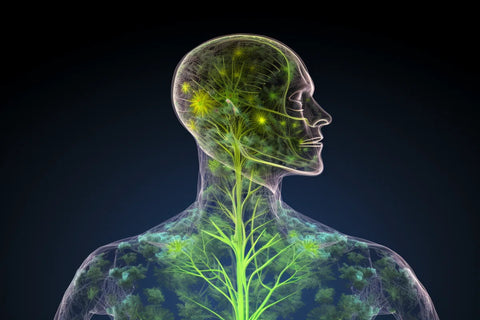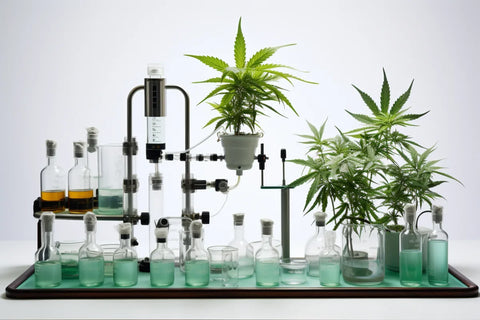With the widespread use and acceptance of CBD in various forms such as CBD oils, CBD capsules, and CBD flowers and CBD hash, it’s natural for users to wonder about how long CBD stays in their system. The answer to this question is crucial for those who may need to undergo drug tests or are concerned about possible interactions with other medications.
Fundamentals of CBD metabolism and elimination
To understand how long CBD remains detectable in your system, we first need to comprehend how it's metabolized and eliminated by the body.
The role of the liver
CBD consumption results in its entry into the bloodstream, then reaching the liver, where it gets metabolized. Cytochrome P450 enzymes present in the liver break down the CBD molecules into more than 100 different metabolites. These metabolites go through further modifications, eventually making them water-soluble components that can be easily disposed of by your body via urine.
Half-life of CBD
After consuming CBD, you might think that it takes a certain amount of time for it to vanish from your body completely. However, that's not exactly true. Instead, the duration should be measured based on its half-life, or the time it takes for the concentration of the substance to reduce to half its original level.
Scientific studies report varying half-lives of CBD ranging between 18 to 32 hours. This means that it takes approximately 1 to 2 days for the CBD concentration in your body to decrease by 50%. In some cases, CBD might remain detectable for as long as 3-4 days or even up to one week in certain individuals.
Factors that influence CBD retention in your system
It's essential to note that there is no one-size-fits-all answer to the question of how long CBD stays in a person's system. Each individual has a unique biology, and numerous factors influence the duration it takes for CBD to be eliminated from the body. These factors include:
1. Dosage
The amount of CBD you consume plays a crucial role in determining how long it remains in your system. Higher doses tend to have longer-lasting effects, resulting in the presence of CBD in your body for an extended period.
2. Frequency of use
Not just the dosage, but also the frequency of your CBD consumption affects its presence in your system. Regular users may exhibit cumulative levels of CBD in their bodies compared to occasional users.
3. Bodyweight and composition
Bodyweight and fat content can significantly impact how long CBD stays detectable in your system. Since CBD is fat-soluble, people with a higher percentage of body fat might retain CBD more extensively than those with lower body fat percentages. This leads to a longer elimination process since the stored CBD releases gradually into the bloodstream over time.
4. Metabolism
An individual’s metabolic rate can also play a significant role in how long CBD stays in their system. A faster metabolism speeds up the breakdown and elimination of CBD, whereas slower metabolisms result in CBD lingering for an extended period.
5. Method of consumption
- Vaping or smoking: Inhalation of CBD flower provides rapid absorption, as it enters directly into the bloodstream via the lungs. However, this method also results in quicker elimination since the metabolites get rapidly eliminated through the urine.
- CBD oils: Sublingual consumption allows CBD to absorb quickly into the bloodstream while bypassing the digestive system. Therefore, it stays detectable for a relatively less duration compared to oral ingestion.
- CBD Capsules and CBD gummies: Oral ingestion involves passing through the digestive system, resulting in slower absorption but longer presence in the body due to "first-pass metabolism" by the liver.
- Topicals: Topical application of CBD doesn't enter the bloodstream, which means it may not be detectable in blood tests or affect other variables that influence CBD retention.
CBD drug testing: What you need to know
Employers and law enforcement agencies typically use drug tests to screen for controlled substances, primarily cannabis-derived tetrahydrocannabinol (THC), and its metabolite THC-COOH. Pure CBD does not induce psychoactive effects, making it unlikely to be targeted in drug screenings. Nonetheless, depending on the type and sensitivity of the drug test, falsely positive detections for THC can sometimes occur, especially if the person has been using a full-spectrum CBD product containing trace amounts of THC.
Different types of drug tests have varying detection windows for CBD and THC. Here is a general overview:
- Urine test: The most common form of drug screening; can detect cannabinoids like THC for up to 3-30 days after consumption depending on usage frequency and concentrations.
- Blood test: Usually reserved for investigations into recent drug use; can detect THC and its metabolites for up to 24 hours, while CBD is typically undetectable after a few hours.
- Hair test: Can reveal long-term drug exposure patterns over several months but generally doesn't detect CBD consumption.
- Saliva test: Gaining popularity for on-site drug screenings; typically detects THC for up to 72 hours.
Keep in mind that these detection windows are estimates and can vary based on individual factors such as metabolism, frequency of use, and the sensitivity of the test.
To sum it all up
Understanding how long CBD stays in your system involves recognizing various factors, including dosage, frequency of use, bodyweight, metabolism, and method of consumption. While most people will find that CBD is eliminated from their body within a few days, there are some cases where it may be detectable for longer periods.
By providing clarity on the retention of CBD in the human system, individuals can make informed decisions about consuming this natural compound while being mindful of any potential drug testing implications or interactions with other medications.



